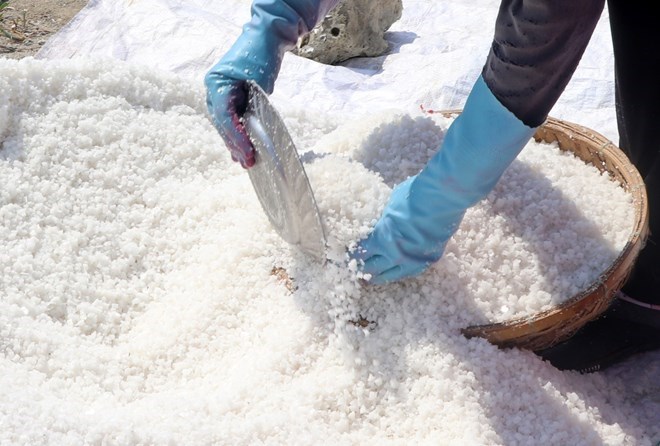
The Iodine Global Network has ranked Vietnam among the top 19 iodine-deficient countries, according to the Vietnamese Health Ministry's National Institute of Nutrition (NIN).
 |
| A farmer harvests salt. |
The Iodine Global Network has ranked Vietnam among the top 19 iodine-deficient countries, according to the Vietnamese Health Ministry’s National Institute of Nutrition (NIN).
A 2013-2014 report by the National Hospital of Endocrinology showed that goiter (neck swelling from enlarged thyroid) rate among children aged 8-10 was 9.8 percent while the coverage of household iodized salt consumption was nearly 60 percent.
Meanwhile, its 2000-2010 study pointed out that food grown naturally in the country held an inconsiderable amount of iodine that can’t meet body demand. Only 6 percent of respondents said they use iodized salt while 75 percent of the remaining season their food with fish sauce and other seasonings.
Before 2005, Vietnam conducted a national target programme on iodine addition. However, after iodine deficiency was eliminated, regulations on compulsory use of iodine were removed so iodine consumption slumped suddenly. The lack of a national target programme on goitre prevention and control or State funding to mix iodine into salt also made people switch to using non-iodised seasonings.
The NIN said a governmental decree on adding micro-nutrients into food took effect in March 15, 2017 but it was ignored by most firms.
Do Hong Phuong, nutrition policy expert from UNICEF said among 130 countries that enforce use of iodine, 69 required iodized salt be used in processed food.
She said adding micro-nutrients into food only costs 0.06 USD per person per year, and urged food processors to raise their sense of social responsibility.
The NIN warned that iodine deficiency will lead to goitre, mental retardation, miscarriages and brain damage in the fetus and infants.
The recommended dietary allowance of iodine is 90-120 mcg per day for children and 150 mcg per day for adults. Sea fish, seaweed, amaranth and watercress are all rich in iodine.
(Source: VNA)





